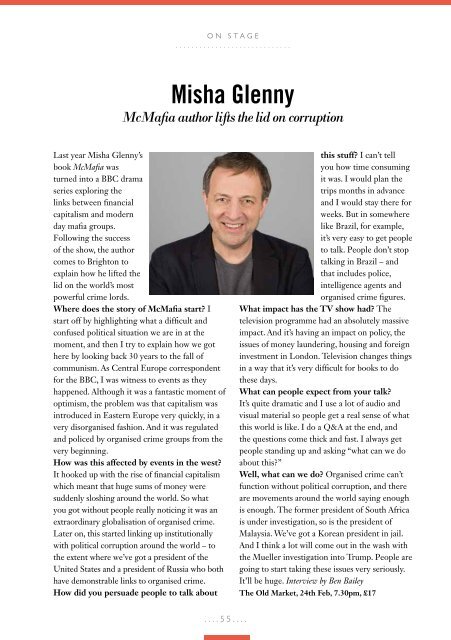Viva Brighton Issue #72 February 2019
You also want an ePaper? Increase the reach of your titles
YUMPU automatically turns print PDFs into web optimized ePapers that Google loves.
ON STAGE<br />
.............................<br />
Misha Glenny<br />
McMafia author lifts the lid on corruption<br />
Last year Misha Glenny’s<br />
book McMafia was<br />
turned into a BBC drama<br />
series exploring the<br />
links between financial<br />
capitalism and modern<br />
day mafia groups.<br />
Following the success<br />
of the show, the author<br />
comes to <strong>Brighton</strong> to<br />
explain how he lifted the<br />
lid on the world’s most<br />
powerful crime lords.<br />
Where does the story of McMafia start? I<br />
start off by highlighting what a difficult and<br />
confused political situation we are in at the<br />
moment, and then I try to explain how we got<br />
here by looking back 30 years to the fall of<br />
communism. As Central Europe correspondent<br />
for the BBC, I was witness to events as they<br />
happened. Although it was a fantastic moment of<br />
optimism, the problem was that capitalism was<br />
introduced in Eastern Europe very quickly, in a<br />
very disorganised fashion. And it was regulated<br />
and policed by organised crime groups from the<br />
very beginning.<br />
How was this affected by events in the west?<br />
It hooked up with the rise of financial capitalism<br />
which meant that huge sums of money were<br />
suddenly sloshing around the world. So what<br />
you got without people really noticing it was an<br />
extraordinary globalisation of organised crime.<br />
Later on, this started linking up institutionally<br />
with political corruption around the world – to<br />
the extent where we’ve got a president of the<br />
United States and a president of Russia who both<br />
have demonstrable links to organised crime.<br />
How did you persuade people to talk about<br />
this stuff? I can’t tell<br />
you how time consuming<br />
it was. I would plan the<br />
trips months in advance<br />
and I would stay there for<br />
weeks. But in somewhere<br />
like Brazil, for example,<br />
it’s very easy to get people<br />
to talk. People don’t stop<br />
talking in Brazil – and<br />
that includes police,<br />
intelligence agents and<br />
organised crime figures.<br />
What impact has the TV show had? The<br />
television programme had an absolutely massive<br />
impact. And it’s having an impact on policy, the<br />
issues of money laundering, housing and foreign<br />
investment in London. Television changes things<br />
in a way that it’s very difficult for books to do<br />
these days.<br />
What can people expect from your talk?<br />
It’s quite dramatic and I use a lot of audio and<br />
visual material so people get a real sense of what<br />
this world is like. I do a Q&A at the end, and<br />
the questions come thick and fast. I always get<br />
people standing up and asking “what can we do<br />
about this?”<br />
Well, what can we do? Organised crime can’t<br />
function without political corruption, and there<br />
are movements around the world saying enough<br />
is enough. The former president of South Africa<br />
is under investigation, so is the president of<br />
Malaysia. We’ve got a Korean president in jail.<br />
And I think a lot will come out in the wash with<br />
the Mueller investigation into Trump. People are<br />
going to start taking these issues very seriously.<br />
It’ll be huge. Interview by Ben Bailey<br />
The Old Market, 24th Feb, 7.30pm, £17<br />
....55....


















